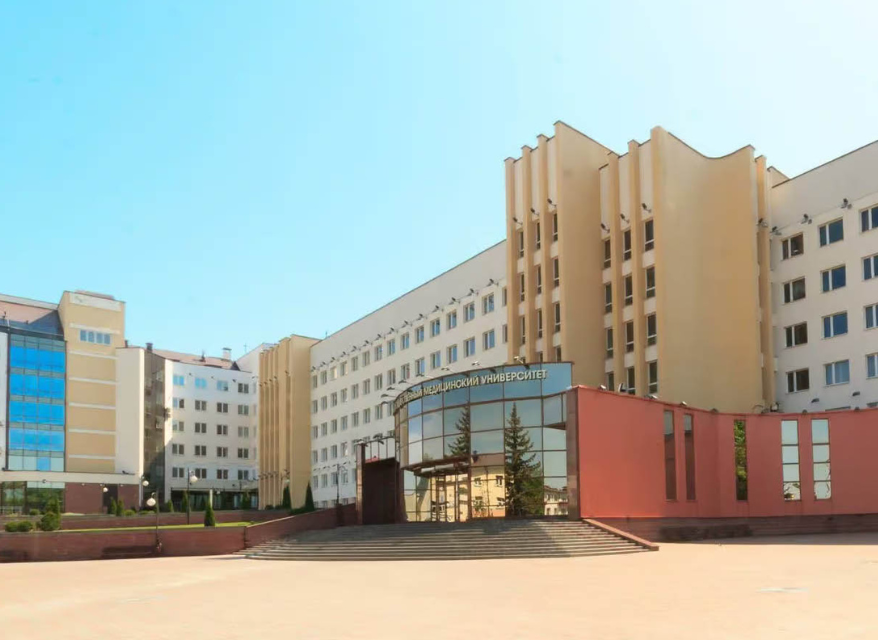Vitebsk State Medical University
About Vitebsk City
Vitebsk is one of the biggest cities of the republic and is situated in the north-east part of Belarus. It is 281 km away from Minsk. It is an ancient city which founded in 974. About 400 thousand people live here. The city is surrounded by Lakes, beautiful gardens & country side. Vitebsk is located on the bank of one of the largest European rivers – the Western Dvina. Picturesque neighborhood of Vitebsk and its ancient streets was always attractive for painters. Vitebsk today is a major industrial, scientific and cultural center of the republic Belarus.
Introduction
Vitebsk State Medical University was established in 1934. In 1940, Medical faculty was opened with 32 theoretical and clinical departments. 1981 teaching foreign students in Medicine & Pharmaceuticals faculties stated. In 1984 the Faculty for Advanced Specialization in General Medicine was established. In 1999, for the experience in training physicians for Asia, Africa, Europe and Latin America, Vitebsk State Medical Institute was awarded with the Medical of Peoples Friendship by the Presidium of the Supreme Soviet Union.
The same year it was accredited to University status. Vitebsk State Medical University is ranked very high among the former USSR medical educational establishments. It has highest number of foreign students from all over the world, which makes it an international educational institution.
In WHO International ranking, VSMU holds 16th position. Students from more than 50 countries are pursuing their studies here, mainly from India, Sri Lanka, Bangladesh, Pakistan, Nepal, Lebanon, Syria, Jordan, Egypt, Germany, Poland, England, Iran, China, Malaysia and Mauritius etc. At present, more than 4000 students are studying in VSMU out of which 200 are Indians.
Science & Research Activities
There is a Central Scientific Research Laboratory with modern equipment for training highly qualified specialists at the University. The University possesses faculties appropriate for training specialists at a higher school. The University is a large scientific center : 55 doctors and 204 candidates of science work in it.
The main directions of its research activities are : transplantation of tissue and organs, cardiovascular diseases, immune-deficient conditions, role of hereditary factors in the development of parasitogenic process, diseases of abdominal organs, arterial hypertension and the principles of its prevention, infections in surgery, development of minor invasive surgical methods, brain injury, development of technologies of new medicine preparations. VSMU publishes Magazines like Surgery News, Pharmacy News, Immunology, VGMU News, Motherhood & Childhood Protection and one Regular Newspaper “Medvuzovets”.
Education Base
Educational processes are organized at 58 departments, where 60 doctors and 181 candidates of sciences, including 39 professors and 145 associates professors, work. The educational departments are equipped with modern automatic apparatuses for training, sets of plastic models and phantoms, complex medical-diagnostic equipments. The teaching is supported with skilled pedagogical experience, highly-qualified research activity and great academic means of training. Ratio and 3 -stage system of student’s knowledge assessment is used at the university. To improve the quality to teaching educative-industrial pharmacy, dental clinic, and control-analytic laboratory were created where students are able to put the accepted knowledge into practice.
Overseas Students Training Faculty
In 1981 by the decision of Ministry of Education and Ministry of Public Health Services of the USSR Vitebsk State Medical Institute was the first in Belarus to receive the right of training medical staff for foreign countries. With in 25 years of the Overseas Students Training Faculty existence 1250 doctors and pharmacist have been prepared and now they are working successfully in 110 countries of the world.
Process of Training
The time-frame of academic year are strictly regulated. It is divided into two semesters: Autumn Semester: September – January Spring semester : February – July. The training process in each semester is carried out according to the certified program & includes the precisely established number of disciplines to other semester are not allowed. Foreign citizen are offered English Medium (General Medicine only). The curriculum of both forms of training is the same accept the language of instruction. Educational process is organized on the basis of traditional European curriculum which includes lectures, seminars, laboratory at practical classes. Studying clinical subjects is organized in the forms of cycles.

